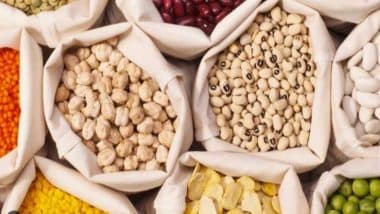New Delhi, September 22: The Parliament on Tuesday passed the Essential Commodities (Amendment) Bill 2020. The bill will remove cereals, pulses, oilseeds, edible oils, onion and potatoes from the list of essential commodities. It was approved by Lok Sabha on September 15, 2020, and was approved by a voice vote in Rajya Sabha.
Earlier on June 5, 2020, the Essential Commodities (Amendment) Ordinance, 2020, was promulgated and amended the Essential Commodities Act, 1955. Farm Bills: What Are The 3 Legislations Brought by Modi Government? Why Are Farmers Protesting? All You Need to Know.
Here's what the Essential Commodities (Amendment) Bill 2020 means. The Bill will:
1) Empowers the Centre to control the production, supply, distribution, trade, and commerce in certain commodities.
2) Seeks to increase competition in the agriculture sector and enhance farmers’ income.
3) Liberalise the regulatory system while protecting the interests of consumers.
4) Remove fears of private investors of excessive regulatory interference in their business operations.
5) Attract private sector/foreign direct investment into the agriculture sector.
6) Create more storage capacities to reduce the post-harvest loss of crops.
7) Give freedom to produce, hold, move, distribute and supply, leading to the harnessing of economies of scale.
Replying to a short debate in the Upper House, Minister of State for Consumer Affairs, Food and Public Distribution Danve Raosaheb Dadarao said, "This amendment is in favour of both farmers and consumers." He was of the opinion that essential commodities act was brought when the country was not self-sufficient in food grains production, however, now the situation has changed.
(The above story first appeared on LatestLY on Sep 22, 2020 01:34 PM IST. For more news and updates on politics, world, sports, entertainment and lifestyle, log on to our website latestly.com).













 Quickly
Quickly




















